If you live in California, you must dispose of batteries very carefully when they are no longer useful; in fact, CalRecycle (California’s Department of Resources, Recycling, and Recovery) labels them as hazardous waste.
Since all of them contain toxic and corrosive materials, if they are not discarded properly, they can end up polluting the Earth, groundwater, and other surfaces.
However, laws about this subject are different in every state.
So, in this article, we will focus on explaining the main regulations and different ways to dispose of batteries in California.
What type of batteries must be disposed of?
In California, all types of batteries must be disposed of. These are part of the group of hazardous waste, and at the same time, they are categorized as universal waste.
This includes:
- Alkaline batteries (AAA, AA, C, D, 6V, 9V).
- Button cell.
- Carbon Zinc (AAA, AA, C, D, 6V, 9V).
- Lithium / Lithium Ion (3V, 6V, 3V button).
- Ni-Cd and Ni-Li batteries (AAA, AA, C, D, 6V, 9V).
- Lead-acid vehicle batteries (12V, 6V).
- Silver Oxide.
Also, it does not matter if is rechargeable or for a single-use; none of them cannot be thrown away in the garbage, as you will normally do with other objects.
The proper thing to do is to discard them on an authorized waste disposal facility or recycling center.
Where to recycle them?
As we mentioned before, the proper way to dispose of batteries is to find a local recycling center to avoid any type of pollution.
Fortunately, there are lots of facilities around California! You just need to find the nearest from you and get in touch with them to give your batteries away.
For your convenience, here are 3 ways to locate one:
CalRecycle
Go to the CalRecycle online directory and select your county: www.calrecycle.ca.gov/HomeHazWaste/Directory.
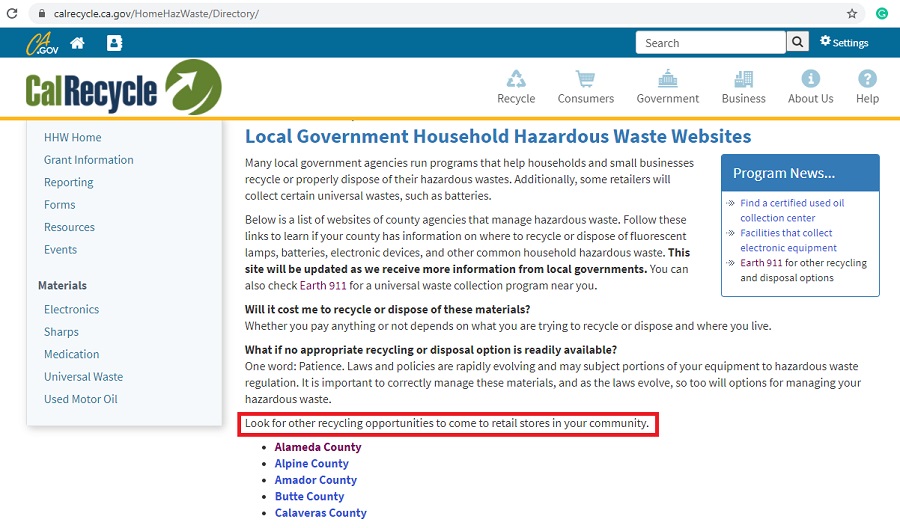
You will be directed to another page with more information about what to do. We recommend you to look for a section that says “batteries”, “household hazardous waste”, or something similar.
Earth911
Go to www.earth911.com and click on “Where To Recycle” on the top green bar. Then, write “batteries” on the search box, your zip code, and click “Search”.
You will see a list of all the programs and authorized recycling centers.
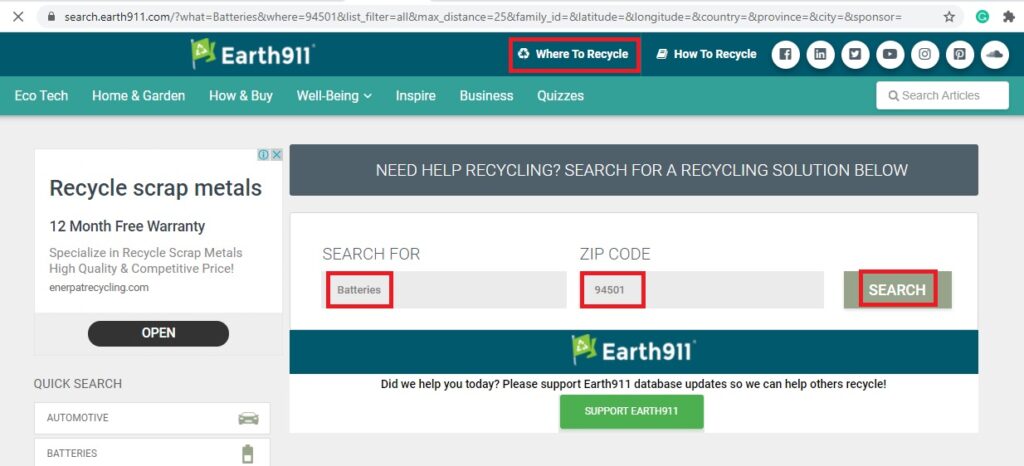
Also, with Eearth911, you can call 1-800-CLEAN-UP (235-2687) and ask for information.
Call2Recycle
Here you will see more helpful resources, including over 34,000 recycling and drop-off centers!
- Go to their website: www.call2recycle.org and click on “Find a location near you”.
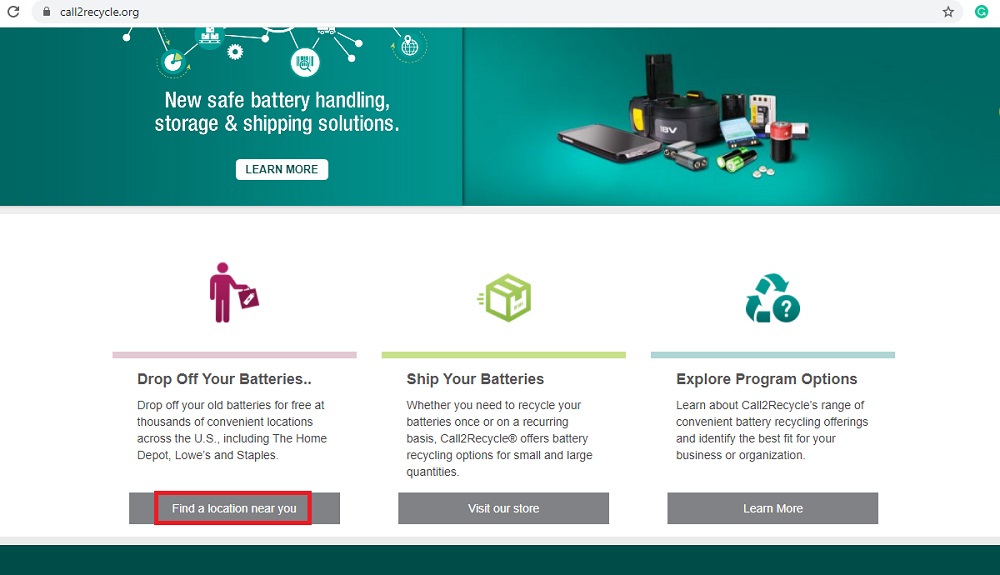
- Search your county on the map, or simply write your zip code in the search box.
- Then, you will see a list of the locations that are near you with contact information such as address, email, phone, and also the types of batteries they accept.
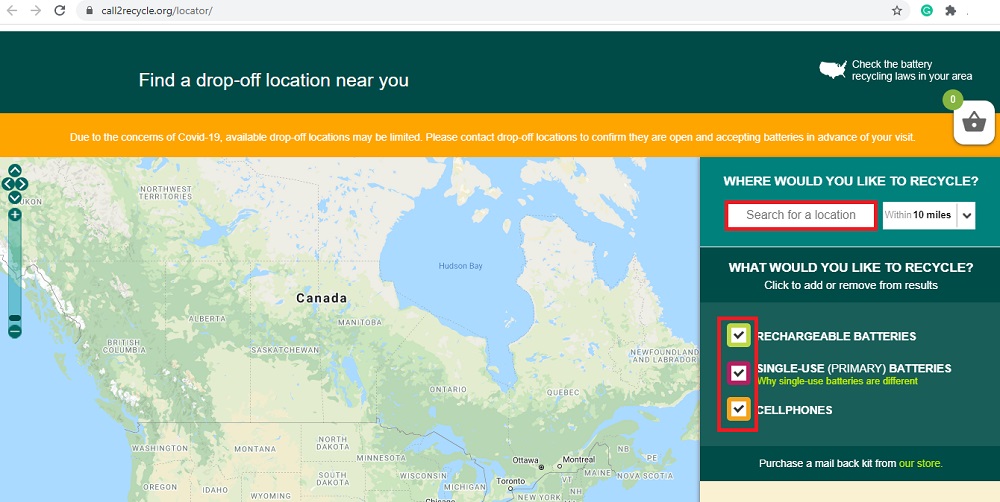
On the other hand, Call2Recycle also provides collection and recycling services for companies, stores, retailers, and other types of businesses; this includes boxes, bags, pails, envelopes, and drums to dispose of batteries, and gloves to manipulate them. If you are interested, click where it says “store” on the top green bar.
What happens to the batteries?
If a battery is severely damaged, most facilities will get rid of it through special procedures. But, if there is something to save, it will be recycled.
Read this infographic to know how they are sorted and transformed into new products.
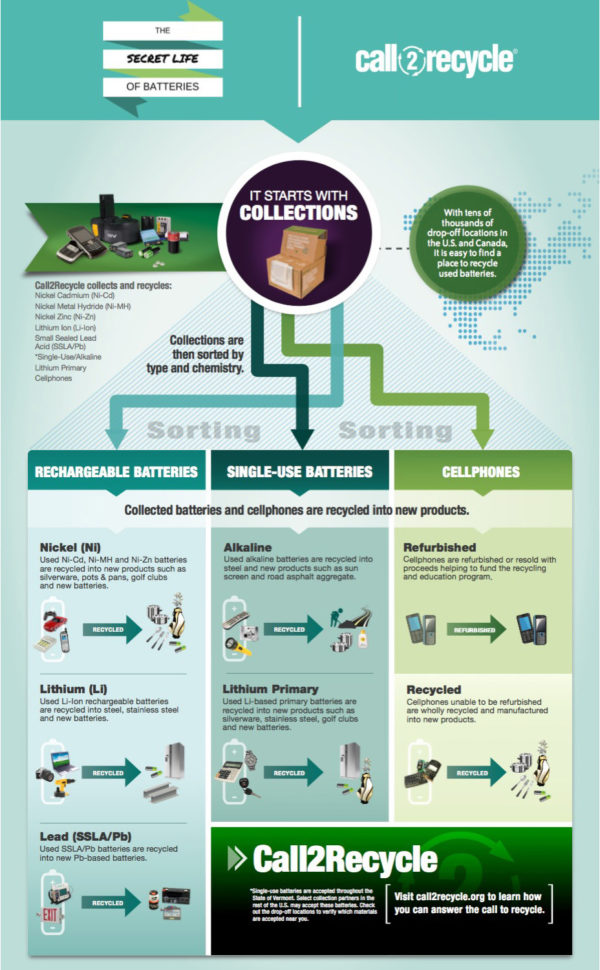
Recommendations
- Use gloves when manipulating batteries (especially if they are corroded or damaged). Then, put them in a fabric bag or a box (do not use plastic!), and make sure to wash your hands when you finish.
- Try to buy rechargeable batteries (with their charger). This way, you will reduce the consumption of ordinary batteries.
- Currently, there are lots of devices that do not use batteries. Instead, they are charged with through mechanical means (by winding, shaking, squeezing) or through sunlight.
Are batteries dangerous?
Most batteries contain Zinc, Mercury, Silver, Lead, and Cadmium. If they are thrown away into landfills, they will pollute soil, water, and other natural resources.
And, if a person gets to ingest or inhale these chemicals, they can cause severe damage to the body. Depending on the duration of the exposure, it can cause issues in the central nervous system, digestive system, and lungs.